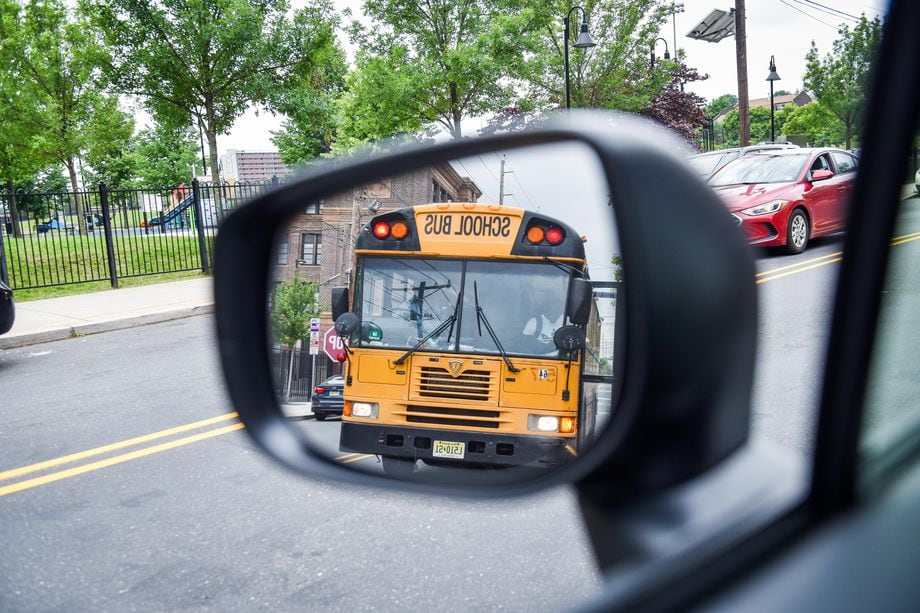Hundreds of Chicago Public Schools’ students with disabilities are facing commutes of more than 90 minutes, even after the district said it worked to address the fallout from a national bus driver shortage last year.
When schools reopened Monday, the district was able to route 15,000 CPS students for the first day, but lengthy commutes have since emerged as a new problem for parents.
Parent Kalaveeta Mitchell said her 17-year-old daughter had not yet been to school because a clerical error removed her from the transportation list. Mitchell said her daughter would be routed by next week.
Without district-provided transportation, it would take four trains and a bus to get her daughter, who has autism and post-traumatic stress disorder, from their Bronzeville home to her Lakeview high school, Mitchell said.
She worries the long commute will be stressful for her daughter. “It’s been a nightmare,” Mitchell said.
During Chicago’s Board of Education meeting Wednesday, CEO Pedro Martinez said about 80% of routes had an average trip of about 39 minutes the first few days of school and about 20% are over an hour. He noted that about 365 students with disabilities had commutes that were over 90 minutes long and another 1,200 students with disabilities or temporary housing are still waiting to be routed.
The district is working to make routes more efficient, but Martinez noted that he wouldn’t be able to guarantee all routes would be under an hour.
“I don’t see us getting 100% of our route in under an hour,” Martinez said. “I just don’t see that as a possibility.”
The district will prioritize meeting outstanding transportation requests after Labor Day, and then work to shorten the length of time students are on buses, Martinez said.
“We’ve been looking at those specific situations, one by one,” Martinez said. “I’m gonna plead and ask their families to continue to be patient with us.”
Last year, the district struggled to meet the transportation needs for Chicago Public Schools’ most vulnerable students. For months, the district failed to provide reliable transportation for students with disabilities — some of whom didn’t have bus rides until after February. The district cited a national bus driver shortage as a reason for the bus problems.
This year, Martinez said the district has been able to leverage multiple forms of transportation including taxis, vans, and $500 monthly stipends for parents. It has also increased bus driver wages to be competitive with suburban districts.
During the meeting, SEIU vice president Stacia Scott said the two-hour-plus routes for children were unacceptable and needed to be corrected immediately to ensure that students are getting to school on time, being fed, and getting special instruction as legally required under each student’s Individualized Education Program, or IEP, a legally binding document that outlines the services for students with disabilities.
“No special education student should be on a bus longer than one hour per ISBE guidelines,” Scott said.
The long routes were also challenging for bus aides, represented by SEIU, who are only paid for 8 hours but were working 15-hour days because of the long commutes, Scott said. “Every bus aide I spoke with yesterday is ready to quit.”
The district was going family by family to make sure concerns were being heard, according to Martinez. It also added five staffers on the transportation hotline to make sure the district is being responsive to families facing transportation challenges.
As drivers and students get acclimated to the new school year, he expected commuting times to improve. “We see things just getting better and better over the year,” Martinez added.
About 1,200 parents who filled out transportation requests after the July deadline will be routed the day after Labor Day, Martinez said.
Since the start of the school year, parents have taken to social media to express frustrations with the district’s continued transportation issues.
Ahead of the new school year, parent Katherine Buitron said two of her children were facing about four hours of commuting each day — with a pick up time as early as 5:45 a.m. for her medically fragile son. The commuting time would make it impossible for him to get his medications on time, she said.
She ultimately decided to take the stipend because she felt like had “no other alternatives.”
But for many parents such as Mitchell, transportation problems are a perennial problem that she and her daughter have endured for as long as they have been in the district.
After a tumultuous couple of years, the long commutes will prove to be challenging for her daughter and the stipends aren’t feasible for all parents, she said.
“CPS is throwing money at this thinking this is an end-all solution when it really isn’t,” Mitchell said. “At best, it’s a minimal solution. At worst, it’s causing havoc on the lives of parents with students with special needs.”
Board president Miguel del Valle said the district was doing everything it could to reduce commuting time. “There was no reason why we should have kids on a bus for more than an hour,” del Valle said.
“Anything over an hour, it’s just, it’s just too much, obviously,” he added. “So we’ve got to do everything possible to change that and change that soon.”
Mauricio Peña is a reporter for Chalkbeat Chicago, covering K-12 schools. Contact Mauricio at mpena@chalkbeat.org.






